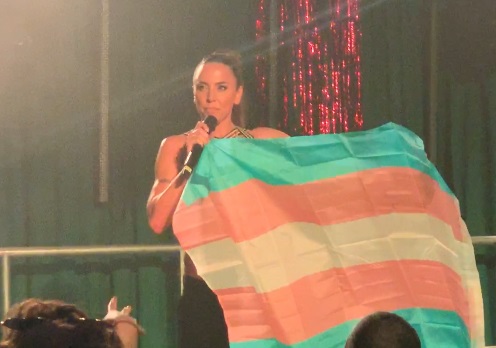This is why Mel C is such a vocal trans ally – and why you should be, too

Mel C showed her support for trans rights at Brighton Pride in 2019.
While performing in this summer, former Spice Girl Mel C draped a pink, white and blue trans flag around her shoulders and expressed her support for transgender rights.
The singer then sang the Spice Girls classic ‘2 Become 1’, dedicating the song to the trans community during her Brighton Pride performance on August 3.
“I’ve been proudly holding the Pride flag everywhere I go, very proudly. But tonight, I’ve been given by one of my dancers, this very special flag, and I’m going to be holding this tonight when I sing my next song,” she said.
“This is a flag that we don’t see often enough. This is a flag we want to see a lot more of. This is for trans and non-binary [people].”
In an interview with Vice, Mel C, 45, reflected on the moment that she – a member of one of the world’s biggest ever girl bands – came out in support of trans rights.
“I didn’t even know the trans and non-binary community had a flag,” she said to Vice, explaining that Grace Shush, a non-binary member of LGBT+ drag collective Sink the Pink, introduced it to her.
Mel C acknowledged that what made the moment in Brighton remarkable is that the UK is a country that’s currently making headlines for its hostility against the trans community.
“I think it’s all fear,” she said. “It’s this social thing; it’s tradition and it’s gone through families. It’s this fear and ignorance… All these things, they all come from fear and just not knowing. Fundamentally, that’s where the problem lies.”
“But if you get to know these people, it dissipates because you think, ‘God, they’re just people too.’ We’re all just people, we all just want the same things.’ That’s one of the reasons why I feel very lucky – not everybody has the opportunity to really spend time with people in the trans and non-binary community.”
Mel C said that she felt ”very passionately” about sending a message with the trans flag.
“I have friends with children and some of them are questioning whether they’ve been born in the right body,” she said.
“Young people know immediately. As soon as they’re able to express that, they need support systems put in place that families can go to.”
“They always say, ‘It’s a phase and they’ll grow out of it.’ You know what, maybe some of the children will, but some of them won’t. It’s a very sensitive subject, but it’s something that I think needs to get more acknowledgement.”

